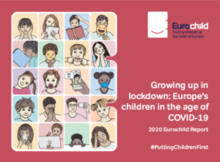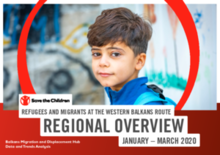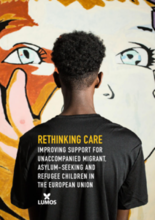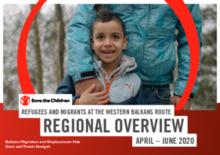Effective
NO SOURCE GIVEN
Social Welfare Spending
NO SOURCE GIVEN
Child Welfare Spending
NO SOURCE GIVEN
i
"Over €100 million from the EU structural funds, including the European Social Fund, the European Regional Development Fund and the European Agricultural Fund for Rural Development, have been allocated to support the process of deinstitutionalisation" (Opening Doors Factsheet, 2018)
Child Protection Spending
UNICEF, 2019
i
"The assessment indicates that in 2018, the core funding for the provision of child protection in 2018 was BGN 227.912.211."
Alternative Care Policy in Line with the 2009 Guidelines
The Family Code; Child Protection Act and its implementing regulation; Ordinance on the terms and conditions for the implementation of measures to prevent child abandonment and placement in institutions and reintegration adopted by Decree in 2003; National Strategy for Vision for Deinstitutionalisation 2010-2025; 2016 Action Plan for the implementation of the National Strategy
i
The National Strategy for Vision for Deinstitutionalisation 2010-2025 takes its mandate from the Guidelines for the Alternative Care of Children, but gaps exist. In terms of alternative care of children, the principles of necessity and suitability are present in the different laws and policies; nevertheless, they have not been made more explicit or accompanied by a clear definition to ensure a more systematic application of them (Analysis of the Child Protection System in Bulgaria, 2019)
Centralised Authority on Adoption
NO SOURCE GIVEN
Commitment to Deinstitutionalistion
Vision for Deinstitutionalisation (DI) of Children in Bulgaria; 2016-2020 Action Plan for deinstitutionalisation; Continuing support for deinstitutionalisation of children and young people project; Updated Action Plan for the Implementation of the Vision for Deinstitutionalisation
i
"The Government’s commitment to achieve a complete transition from institutional to family- and community-based care by 2025, coupled with continued EU support, made Bulgaria a pioneer Member State in leveraging EU funding for catalyzing reforms in child protection" (Opening Doors Factsheet, 2018)
Comprehensive Child Protection Law
Child Protection Act; Constitution of the Republic of Bulgaria of 1991; Law on Social Services; Social Assistance Act; The Family Code; Family Allowances for Children Act; National Strategy for the Child (2008-2018); National Programme for Child Protection; National Strategy “Vision for Deinstitutionalization of Children in Republic of Bulgaria” 2010-2025; National Programme for Prevention of Violence and Abuse of Children 2017-2020
i
"Since the adoption of the Child Protection Act, Bulgaria started building a nation-wide child protection system, which also addresses issues related to prevention, identification and response to violence against children. Progress has been made with regard to knowledge generation; development and implementation of prevention programmes and services; raising sensitivity and awareness; coordination and referral mechanisms; specialized services for children victims of violence and abuse; monitoring and inspection system" (UNICEF, 2019)
Continuum of Alternative Care Services Available
Foster Care, Family-Based Care, Small Group Homes, Residential Institutions, Adoption
i
There has been a considerable increase (over 200%) in the number of children in foster care from 2009 to 2017 (Opening Doors Factsheet, 2018)
Data System
ASA’s Integrated Information System (IIS)
i
"Launching the ASA’s Integrated Information System is a step towards modernization and optimization of the Child Protection system in Bulgaria, as it provides authorities with a tool to collect, store and easily access relevant information without delays. While the current functionalities of the system aren’t built for wider analytical purposes and provide general statistics taken from the multiple registers it holds, there still seems to be untapped potential in its use, as it can provide more insight into case and workforce management, as well as double as a monitoring tool for control of CPDs" (Analysis of the Child Protection System in Bulgaria, 2019)
Existence of a Regulatory Body and Regulatory System
SACP, ASA, Agency for Quality of Social Services and municipalities
i
"The structure of the child protection system is presently built around three institutions with primary responsibility for oversight and control of social services and the quality of the childprotection system: SACP, ASA, and municipalities. However, the 2019 Social Services Act (SSA) envisages the creation of the Agency for Quality of Social Services that will take over some of the control and oversight functions of SACP and ASA" (Analysis of the Child Protection System in Bulgaria, 2019)
Gatekeeping Mechanism/Policy
NO SOURCE GIVEN
i
"There has been considerable investment in ensuring that all children referred to the authorities as being at risk or deprived of adequate care are supported through one unified gatekeeping mechanism. This mechanism applies to all children at risk or deprived of inadequate care, regardless of whether they are referred by a health, education, police or other professional or by a member of the public. Gatekeeping is led by an assigned social worker from the municipal Child Protection Department. They work in partnership with the child, his/her family, and health, education, police and other professionals to assess and respond to the care needs of the child. Decisions associated with placements into alternative care and removal or restriction of parental rights are taken by the local judiciary" (Gatekeeping - Making Decisions for the Better Care of Children, 2015)
Means of Tracking Progress with Reforms
NO SOURCE GIVEN
Moratorium on Admission into Institutions for Children Under 3
NO SOURCE GIVEN
i
This is part of the new Social Services Act adopted by the government in 2019.
Moratorium on New Institutions
NO SOURCE GIVEN
i
This is part of the new Social Services Act adopted by the government in 2019.
National Action Plan to Guide Reforms
Vision for Deinstitutionalisation (DI) of Children in Bulgaria; 2016-2020 Action Plan for deinstitutionalisation; Continuing support for deinstitutionalisation of children and young people project; Up-dated Action Plan for the Implementation of the Vision for Deinstitutionalization
i
The National Network of Children Bulgaria, the Coalition 2025 and the Expert Working Group on Deinstitutionalisation express concerns that the 2016-2020 Action Plan for deinstitutionalisation lacks clear division of responsibilities between relevant authorities; there is no multilateral coordination of activities with partners and stakeholders; the document lacks detailed planning, including specific timelines and monitoring. Furthermore, there was no consultations held regarding different operations under the Operational Programmes: neither in the Expert Working Group on Deinstitutionalisation nor in the Inter-Ministry Working Group (within the Council of Ministers). Furthermore, institutions for children in conflict with the law are excluded from the strategy on deinstitutionalisation (Opening Doors Factsheet, 2018)
National Standards of Care
NO SOURCE GIVEN
i
The government is working right now on those. They will be in place in 2022.
Prevention of Separation Services Available
NO SOURCE GIVEN
i
"There are more than 600 social services for children now funded by the national budget...In 2017 the work on developing a new Social Services Act was resumed." (Opening Doors Factsheet, 2018) However, the UNICEF analysis of the child protection system in Bulgaria (2019) found that prevention of family separation services are generally inefficient and current public policies do not correspond to the needs of the families, noting that "in their current state, efforts to prevent family-child separation suffer due to the fact that the guidelines and measures are scattered in multiple documents." Furthermore, the report notes that "prevention of child-parent separation is not yet fully operational: children are still separated in the same proportions over the years but placed with foster families rather than in residential care. Entrenched poverty and lack of community support are still amongst the main causes of parental neglect."
Support for Careleavers (in Legislation and in Practice)
Eurochild's "Growing up in lockdown: Europe’s children in the age of COVID-19" report, 2020
i
There is no state policy with respect to care leavers in Bulgaria. There is a general provision for preparation of a care leaving plan which in practice means a meeting between a social worker and a care leaver to complete a template.
Closure of Specialised Institutions for Children with Disabilities
Opening Doors Factsheet, 2018
Closure of Specialised Institutions for Children Deprived of Parental Care




